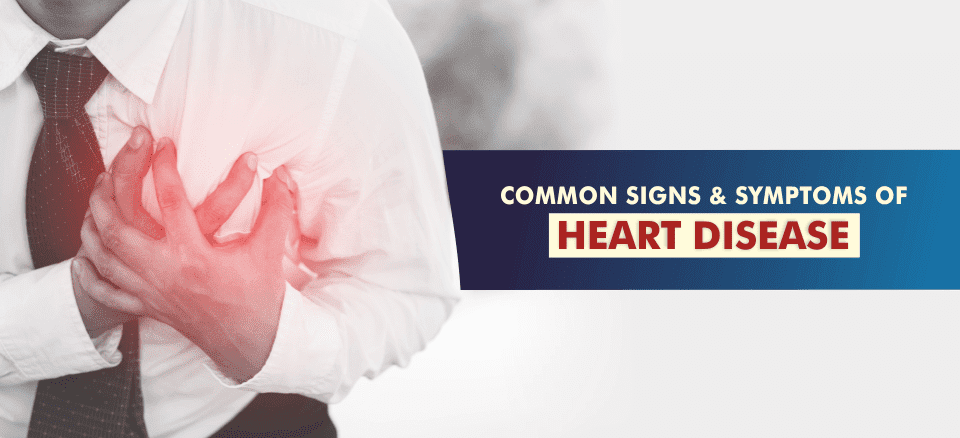


[vc_row][vc_column][vc_column_text]Heart troubles are frightening. In fact, cardiovascular diseases are the leading cause of death in India. Still, the good news is that numerous common symptoms of heart disease can warn you of impending danger.
Heart disease symptoms are often subtle. Hence, you must stay alert and note any changes in your overall health as these may hint toward the possibility of a heart problem. However, the signs in women may be different from men.
The heart is the centre of blood pumping and circulation in the body. That’s why signs and symptoms of heart disease are often synonymous with chest discomfort or pain. However, not all chest pain is a sign of heart disease—there are other causes that you must consider. For example, most women who experience chest pain are simply experiencing regular stress and anxiety. Men and older people more commonly experience chest pains caused by heart disease.
When you’re experiencing chest pains, it’s essential to pay attention to how frequent the pain occurs and how long each episode lasts. If the pain lasts longer than a few minutes, it’s best to seek medical help immediately.
You may also feel pain and/or tightness in your upper back or neck, often radiating out to one or both arms, shoulders and jaw areas. This is due to reduced blood flow to your upper body muscles when the coronary arteries experience a blockage.
Dizziness is one of the most common symptoms of heart disease. Unfortunately, it’s also often overlooked, and patients may not associate it with their hearts. If you feel dizzy, especially on an ongoing basis, visit your doctor to find out an underlying cause. Heart troubles are often subtle and painless in the early stages so take them seriously.
Feeling tired is another notable symptom of a heart ailment because the blood flow to your body isn’t adequate. This can result from not getting enough oxygen from the lungs or a weak heart that cannot pump blood effectively. The exhaustion may cause you to avoid exercise and other physical activity. This further causes your condition to worsen.
A cold sweat is a clinical term for perspiration that does not stem from external heat or physical exertion. Instead, it originates from the autonomic nervous system’s reaction to stress or anxiety. Cold sweats can also be triggered by sudden blood pressure drops and serious illnesses, including heart attacks and stroke.
Some of the common causes of cold sweat include:
Cold sweats are typically accompanied by one or more of the following symptoms:
Shortness of breath is a common symptom of a heart attack, congestive heart failure, and pulmonary embolism.
If you have any chest pain or pressure that lasts for more than a few minutes and/or causes extreme discomfort, you should call an ambulance immediately. Chest pain with shortness of breath is a symptom of a heart attack.

Heart palpitations are heartbeats that suddenly become more noticeable. This feeling is entirely normal, and you may experience it from time to time. You can experience palpitations due to stress, exercise, or drinking caffeine or alcohol. They can also be due to some over-the-counter medicines.
If you are experiencing palpitations and feel short of breath or dizzy along with them, seek immediate medical help. If you have frequent palpitations that aren’t related to any other symptoms, see your doctor for an evaluation as it may indicate heart trouble.
While you may not necessarily think of swelling in your feet as a symptom of heart disease, it can be. Swelling, specifically oedema, is a sign of impaired blood flow which, in turn, suggests poor circulation. When you have heart disease and your circulatory system isn’t functioning correctly, fluid starts to build up in areas like the feet and ankles.
Other conditions can cause foot swelling as well. Keep in mind that if you’re on your feet for long periods of time or walking around a lot throughout the day, this could also cause some swelling at the end of the day without any other medical condition present.
Oedema may also be due to kidney failure or certain liver diseases such as cirrhosis.
Pain in the hands is often a signal of another condition. However, the connection between the two is important to understand. The heart pumps blood to your hands through arteries that run through your wrist. When these arteries are blocked by plaque, blood flow to the hands can be reduced, resulting in numbness or pain. In this case, it’s crucial to see a doctor immediately.
Other potential causes of hand pain include arthritis and injury (for example, a sprain or fracture). If you’re experiencing hand pain that isn’t severe—and especially if it is accompanied by an increase in activity—keep an eye on it for a couple of days before you call your doctor. Don’t wait so long if you experience any other symptoms of heart disease like chest pain or trouble breathing.
If you have any of the signs mentioned earlier, you must promptly seek medical attention. Ignoring them can worsen the situation. And if a blood vessel is severely damaged, it can lead to a heart attack or stroke.
These conditions are life-threatening and require immediate care. Knowing the most common signs of heart disease is useful in keeping an eye on your health. If you’re feeling strange or unsure about something, it’s always important to have a checkup – whether it is with a doctor or by visiting a hospital.
Visit Amandeep Hospital for Cardiology treatment and get a specialised diagnosis. With our best-in-class equipment and veteran doctors, we offer treatments like heart transplants, stent operations, pacemakers placement, and many more.
Take care of your health! Book an appointment by getting in touch today.[/vc_column_text][/vc_column][/vc_row]
September 30, 2024
Recognize the Signs: Understanding Appendicitis Pain Symptoms
September 24, 2024
Unveiling the Truth: I-Pill Side Effects Every Woman Should Know
We use cookies to enhance your experience. By clicking "Accept", you agree to our use of cookies.